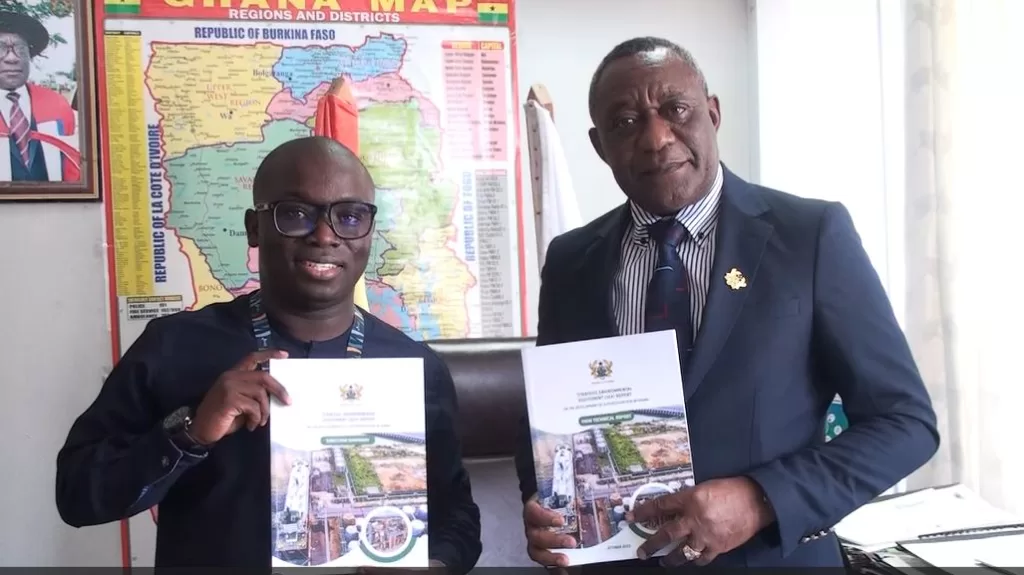By: Mabel Adorkor Annang
The Environmental Protection Agency, EPA has launched a Strategic Environmental Assessment, SEA report on the development of a Petroleum Hub in Ghana.
The findings and recommendations in the report will be incorporated into the strategic decision-making process and guide the establishment of the hub.
To ensure that the establishment of the Petroleum Hub does not destroy the Fauna and Flora of the area which is close to the Ankasa forest reserve the Environmental Protection Agency, EPA launched a Strategic Environmental Assessment report to sensitize decision-makers about the environmental impacts of the facility.
Speaking at the SEA Report Launch the Chief Executive of EPA Mr. Henry Kwabena Kokofu explains the need for the report saying that this will serve as a roadmap to ensure that PHDC’s activities do not affect the environment.
Deputy Executive Director of EPA, Dr. Christine Asare said the Petroleum Hub will be a high monitoring and evaluation area to ensure that the necessary steps are taken to secure the environment.
Chief Executive of PHDC Charles Owusu said the Report is timely as the PHDC is engaging stakeholders and the community in decision-making during the plan preparation process.
PETROLEUM HUB
The Petroleum Hub Development Corporation, PHDC is a megaproject in the Jomoro Municipality of the Western Nzema Traditional Council in the Western Region.
The hub is expected to be a leading integrated petroleum complex that will add value to the upstream and downstream oil and gas value chain in Africa.
The petrochemical facility will cover 20, thousand acres of land and will house a complex web of onshore, offshore and ancillary assets. It will comprise three refineries, five Petrochemical Plants, Shared Storage Interconnected and Jetties with Port infrastructure.
The development of the Petroleum Hub in Jomoro will accelerate the growth of the petroleum downstream sub-sector and make it a major player in the economy.
The Petroleum Hub development will increase the presence of major international oil trading and storage companies, create regional trading champions, and encourage joint ventures between local and international companies for knowledge transfer and wealth creation.
It will also provide the country with Liquefied Natural Gas (LNG) facilities for power production and drive the growth of various industries including petrochemicals.
The development of the Petroleum Hub is expected to transform Ghana’s economy and is projected to create more than 780,000 direct and indirect jobs by 2030.
RECOMMENDATIONS
PHDC must develop and implement an Integrated Biodiversity Management Plan, IBMP with consideration for Gender, the Vulnerable and Excluded/Marginalised.
The Riparian Buffer Zone Policy for the management of water bodies and wetlands within the Petroleum Hub must be implemented.
Compliance with industrial pollution control limits must be ensured by the necessary collaborators.
Operations of the Hub are likely to negatively impact the health and safety of the workers and the people living in the nearby communities, including climate change impacts. The Factories Offices and Shops Act, 1970 (Act 328) enjoins factories, offices, and shops to indicate welfare facilities provided, notification of operational accidents and illnesses, health and welfare standards, safety measures, complaints related to dangerous conditions and practices and related matters in Ghana.
The Monitoring and evaluating emission levels. Resettlement and compensation which must be adequate and timely including land ownership, acquisition and conflicts.
Alternative Livelihood and Support Schemes such as the Livelihood Empowerment Against Poverty (LEAP) must be extended to cover affected groups and individuals who cannot be trained in alternative livelihood schemes especially the aged, women, the vulnerable and the excluded/marginalized.
Inadequate capacity of locals to participate in the development and implementation of the Petroleum Hub activities. The establishment of the Petroleum Hub will have significant economic benefits for Ghana. The key issues identified under the economic pillar include the inadequate capacity of locals to participate in the development of the Petroleum Hub and the creation of jobs and the prevention of job losses.
Develop and implement capacity-building programmes including relevant technical and vocational skills for the locals, CSOs, academia, Traditional Authorities (TAs), and Association of Ghana Industries (AGI), among others with consideration for women, the vulnerable and the excluded/marginalized.
Establish an integrated waste management system within the JMA and the Petroleum Hub under a framework for zero impact philosophy and maximizing local content.
Ensure continuous transboundary dialogue to prevent any potential security threats and conflicts.
Cultural heritage issues are held in high esteem within the communities and could lead to conflicts if not properly managed. It is advised that the PHDC should work with TAs and local communities to develop unambiguous guidelines on cultural heritage issues to inform potential investors.














